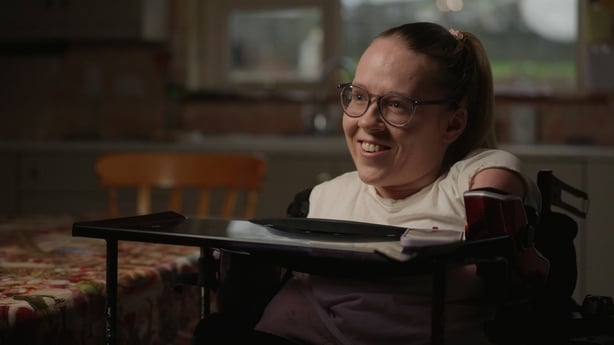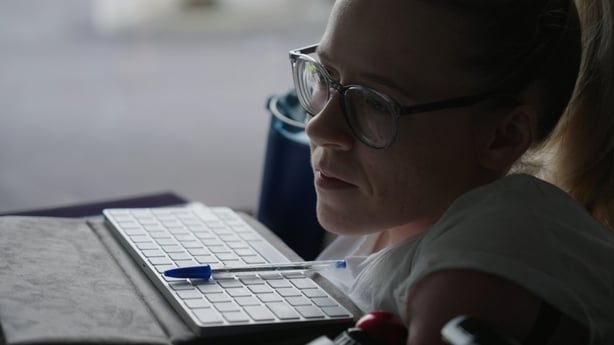The Programme for Government agreed by the incoming coalition includes a commitment to provide "a step change in the supports and services required by people with disabilities."
In total, there are 71 mentions of disability, disabilities or disabled in the 162-page document indicating the area should be a central focus over the upcoming five-year term.
The document states that the Government will "prioritise the publication and funding of a new National Disability Strategy," by 2030, while also committing to "advancing the rights and improving the lives of people with disabilities."
But for one prominent campaigner, such commitments will hold little value unless they are fully implemented.
Disabilities activist and journalist Joanne O'Riordan has been campaigning on many of the issues raised in the document since 2011.
During the 2011 General Election campaign, Ms O’Riordan who was born with a rare condition known as Total Amelia, met with then-Fine Gael leader Enda Kenny who was filmed telling her he would not cut disability funding if elected.
Mr Kenny was duly elected Taoiseach and when some disability funding was cut during his government’s first budget that December, Ms O’Riordan felt compelled to act.
She wrote an open letter to Mr Kenny in the Irish Examiner, criticising the cuts and she has continued to campaign for people living with disabilities ever since.
She has written an updated edition of that letter as part of an upcoming report on Prime Time, this time addressed to the incoming government.
In it Ms O’Riordan urges "action" and says the "time for political promises and lip service is long past."
Dear future government,
In case you don’t know me, my name is Joanne O’ Riordan. I am 28 years old, from Millstreet in Cork, and I was born with a rare condition known as Total Amelia, meaning I was born without all my limbs.
You may remember me from such broadcasts as the Paralympics 2020 and 2024, a documentary I fronted that looked at the challenges facing women in sports, or maybe you know me from the Irish Times, where I wrote a column highlighting various issues in sports, such as equality in sport.
I write to you now on behalf of not only myself but the countless individuals with disabilities who are fed up, exhausted, and broken from fighting a system that consistently fails us. We are tired of being left behind and ignored. The time for talk is over — real reforms are needed now.
I contacted my local representatives, the three main parties, the Regional Independents Group, and Michael Healy Rae, outlining the challenges that countless others like me face.
For those who responded (shockingly, it was very few!), thank you for even sending a generic response.
Like many others, I have been fighting for the most basic support for the past 14 years. These fights are over really simple things like getting carers to assist me in going to work every day and fighting for my mother to be recognised as my carer even though she was cut off from the carer allowance because I have carers for 30 hours a week. This may shock you, but unfortunately, I am not a werewolf; I can’t grow limbs when the moon shines.
I have been fighting for the basic right to live, express myself, contribute to society, and simply be recognised for my worth. Every menial task is a challenge. I face regular inspections concerning my care. Since I have no limbs, traditional modes of transport like a hoist aren’t really suitable for my body type, and for the past 28 years, I’ve been lifted by parents, friends, carers, and the world alike.
However, my way of living can promote chaos amongst the pencil pushers, the red tape creators, the bureaucrats and those who have no clue.
Even before filming a piece for Prime Time that airs on RTÉ One and the RTÉ Player at 9.35, health and safety officers had to assess whether my gym was safe enough for my carers.
Most ironically, I have to go to the gym to keep my weight down and mobility strong, so I am easier to lift. Try and make that make sense! You accuse me of being too heavy, and then when I make plans to lose that weight, you say that’s a new risk?
As Boris Johnson so eloquently put it at a French-Canadian meeting, "Donnez-moi un break!"

I deserve to live independently and not rely on others to do it for me. It’s burdensome, exhausting, and frankly can be socially isolating when friends want to meet outside that 30-hour window I have my personal assistants.
There’s a constant fight between being super dependent on those around you while trying to be independent, free and a regular person.
It’s miserable having to live your life in fear.
Fearful that the the plug could be pulled on my care if it was deemed that my assistants were in an unsafe situation.
Fearful that if I earn a certain amount over a threshold, my financial support for being disabled could be taken away, because apparently money makes you grow limbs.
Fearful that life becomes meaningless — reduced to bureaucracy and red tape — slowly chipping away at your confidence and sense of self, leaving you isolated, frightened, and uncertain about your future.
Fearful that once your nearest and dearest move on, you’ll be left fending for yourself or stuck in a care home at the grand old age of 30 years old.
Right now, people with disabilities and their carers are being pushed to their limits. Carers are burnt out, financially strained, and emotionally overwhelmed.
Those of us with disabilities face barriers at every turn — obstacles that prevent us from living independent and fulfilling lives. The current system is not just inadequate; it is actively harmful.
As mentioned, I have sent a series of reforms to my local TDs, the main political parties, the Regional Independent Group and Michael Healy Rae. The proposal outlines three key reforms to improve the lives of people with disabilities and their carers.
Firstly, the Carer’s Allowance should be reformed to provide financial compensation to family and informal caregivers, recognising their vital role in providing care and reducing institutional care needs. This reform would include tiered compensation based on the intensity of care provided, flexible payment options, and additional benefits such as access to health insurance, mental health services, training, pension contributions and respite care allowance.
Secondly, a Universal Basic Income (UBI) for people with disabilities is proposed to provide a guaranteed income to cover basic living expenses, support independence, and promote social participation. The UBI would be set at a level to cover basic needs without discouraging work and could replace existing means-tested benefits.
Finally, reforms to independent living packages are recommended, drawing on successful models from Scandinavian countries. These reforms focus on personalised care plans, client autonomy, accessible and flexible service models, integrated health and social services, financial support for families and informal caregivers, and drawing on Norway’s "user-controlled personal assistance" model, providing clients with more control over their support.
Clients could hire, train, and manage their caregivers, promoting autonomy and customised care. Governments can allocate funding directly to clients for flexibility in hiring personal care assistants.
Take personal care a step further, like Sweden, and adopt legislation similar to Sweden’s Personal Assistance Act, introduced in 1994, which has had a transformative impact on the lives of people with disabilities, promoting independence and inclusion. The legislation provides individualised support, enabling those with significant disabilities to hire personal assistants who help with daily tasks such as eating, personal hygiene, and mobility.
This assistance empowers individuals to live in their own homes, participate in education, work, and social activities, and exercise greater control over their lives. Currently, there is no legal right to personal assistance in Ireland.

I urge you to act on these proposals immediately. I would be proud if you took the reforms I sent and pretended they were your own — what matters most is meaningful change, not credit.
These reforms are designed to ensure fairness, dignity, and equal opportunities for all, and I will not stop advocating until they are implemented. But the truth is, I should be able to live my life and not have to advocate for every stroke of a pen.
It’s time to build a society that values and uplifts everyone, regardless of ability. This means removing means-testing for carers’ allowances, implementing vital services for independent living, and ensuring that sudden thresholds or cuts do not penalise those already struggling.
The time for political promises and lip service is long past. This is a call for action. I urge you to take this message seriously, listen to the voices of those who live this reality daily, and deliver the reforms we desperately need.
It’s time to serve everyone in this country — not just the privileged few.
Sincerely,
Joanne O’ Riordan.
Watch the report with Joanne O’Riordan and producer Lucinda Glynn on the 21 January edition of Prime Time on RTÉ One and the RTÉ Player at 9.35pm.


